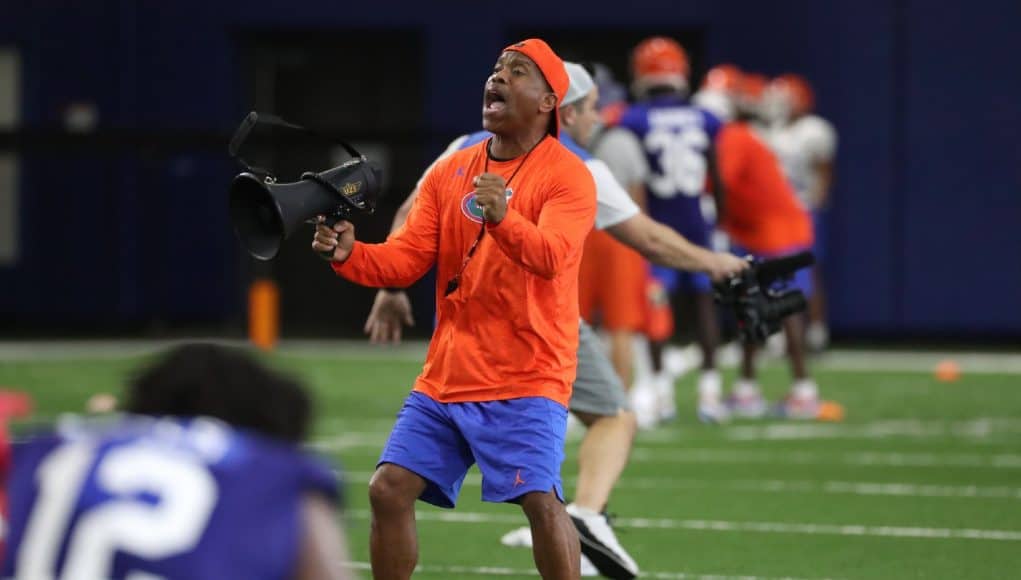The Gators have added a trio of highly rated running back recruits over the last three offseasons. They signed Nay’Quan Wright out of high school in 2019, while former five-star prospects Lorenzo Lingard and Demarkcus Bowman transferred in from Miami and Clemson, respectively, over the past two winters.
All three of them enrolled at UF with differing degrees of high expectations placed on them by the outside world. Two of them failed to live up to those expectations in their first years as Gators. Wright played in just three games, carried the ball 12 times and redshirted. Lingard carried the ball just five times in 2020.
A similar storyline will likely play out with Bowman this fall. You’ll probably be screaming at your television wondering why one of the best athletes on the roster can’t get carries when the game is on the line.
Well, running backs coach Greg Knox has a couple of simple rules that his players have to follow before he’ll put them in games, and those rules apply regardless of how electric a player is with the ball in his hands.
“I tell them when they first get here, it takes two things to play here,” Knox said. “Number one, you’ve got to protect the ball. Number two, you’ve got to protect the quarterback. If you can’t do those two things, you can’t play. I can’t justify putting you in the game.
“So, I think everyone in that room, they understand that. They’ve grasped the understanding of that, knowing that ‘If I don’t protect this quarterback, if I can’t pick up a blitz and I can’t protect the ball, I can’t play.’”
That second rule, protecting the quarterback, typically is what holds young players like Bowman back. It’s just not something that they were asked to do very often in high school, and the punishments for missing a block typically weren’t very severe.
Bowman averaged more than 11 yards per carry over his final three years at Lakeland High School. The value he brought to the team with his running ability far exceeded any damage a missed block might’ve caused. Lakeland’s coaches couldn’t afford to take him off of the field for any length of time.
That’s not the case in college. Nobody is going to average 10 or more yards per carry at this level, so every mistake a running back makes is magnified. Plus, Knox has more quality options to choose from than even the best high school programs.
“It’s not always about talent and what you can do,” redshirt senior Malik Davis said. “That’s not really what gets you on the field. Your coach has got to build trust in you. By doing that, that’s just going out and practicing, executing plays and showing him that you know what you’re doing, you know your assignment every play. I think that’s the best advice I can give a young guy that’s coming in.”
Another aspect of the position that Knox stresses with young players is reading the defense and setting up your blocks accordingly. You can’t expect to just outrun everybody anymore. It takes patience, intelligence, discipline and strategy to squeeze the most out of every run.
“You have to understand the blocking scheme,” Knox said. “Is it a zone scheme? Is it a gap scheme? What’s the blocking scheme, and how can I use the blocking scheme to my advantage? So, I tell them all the time, as you line up, you’re gathering information from the defense, you take it, you process it. You should be able to block the play as a running back before the ball was ever snapped.
“I think that’s one of the biggest keys with our guys. I think that’s why Lorenzo is playing much faster now than he played last year. He’s more comfortable in the offense. He can process information, and he can use it to his advantage and execute to a high level. I see that in all my veteran guys whether it be [Dameon] Pierce, Davis, Nay’Quan Wright, Lingard, those guys that have been in the program for years, they play relaxed and they execute at a high level because they don’t think. They just react.”
Don’t get it wrong: Knox isn’t disappointed or discouraged at all by what he’s seen from Bowman in training camp. He’s been pleased. This is merely an expected challenge that most young running backs face.
Wright improved his blocking and receiving and is now a key member of the rotation. Lingard has been one of the biggest breakout stars of the offseason and is expected to contribute significantly more this season. There’s no reason to think that Bowman won’t follow that same development path.
“He is a very, very good running back,” Knox said. “Now, we’ve just got to get him to understand the offense, learn the offense and develop as a young player. He’s still a young player; he’s still a freshman. And so, he’s learning a totally new offense, and, like I said earlier, pass-protection is one of the biggest things he has to grasp and take hold of as a young player.
“It’s tough right now, but he’s learning a lot. He’s trying to be very detailed in meetings. He’s taking notes, and he’s getting better every day. But I’m excited about what we’re seeing right now.”
So, if Bowman doesn’t get more than 15 carries or so this season, don’t panic. This is all part of a long-term process with Bowman’s best interests in mind. If you don’t protect the quarterback in the NFL, you won’t play.
And you won’t play for Knox in college, either.


